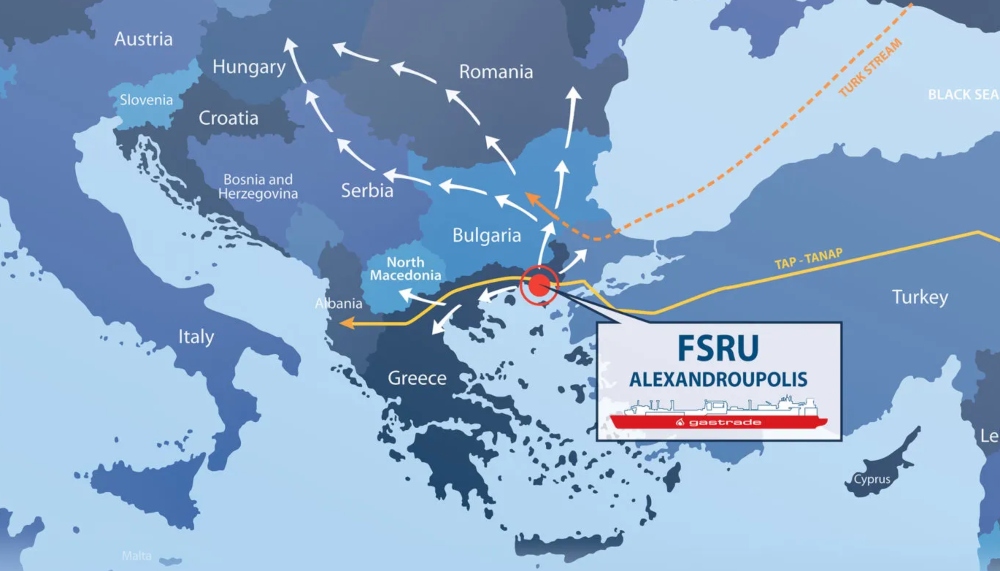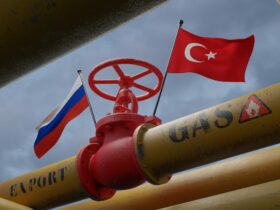From the “independence” to the “dependence” pipelines
From the “independence” to the “dependence” pipelines
By Dimitris Konstantakopoulos, from Athens / Greece
The Greek government of Kyriakos Mitsotakis, by common consent one of the worst in Greek history (*), is now triumphantly claiming a major success by making Greece a “hub” for American LNG.
In the past, starting with Spyros Markezinis in the 1950s and continuing with the governments of Konstantinos Karamanlis, Andreas Papandreou, and Kostas Karamanlis, Greek governments while suffocating in the environment of comprehensive American dependence, attempted or even managed to conclude beneficial agreements with the USSR and later with Russia. Among these was the natural gas pipeline from the USSR to Greece, which was agreed upon, despite American protests, by the government of Andreas Papandreou.
These agreements and the pipeline that brought gas to Greece were deals that increased Greece’s degree of independence and its degrees of freedom from the “collective West,” to which it belonged after the Greek civil war, but which was also the source of all economic, military and geopolitical threats against it. Greece had no problems with the “enemies” of the West. All its problems had their origin inside the alliances it belonged to!
In contrast, the agreements Mitsotakis signed with the Ukrainians and Americans regarding gas, as well as those concerning bases and weapons, bind Greece even more to the US, making it dependent on a “collective West” and particularly the US – a West that, while it has been a teacher on certain issues, has also been a terrible enemy of Greece. Andreas Papandreou’s and Kostas Karamanlis’s pipelines were “pipelines of independence”; Mitsotakis’s pipelines are “pipelines of dependence and subservience”. By the way, one of the “hidden” aims of the bailout implemented in Greece and the bail-in implemented in Cyprus was the destruction of every economic, political, and defense link between the Greek space and Russia. But these links, like Athens’s links with other powers outside American influence, were the prerequisite for Athens to be able to conduct a relatively independent policy and to defend its national interests.
The destruction of Greek – Russian relations was facilitated by the Ukrainian crisis, but it was in itself a goal of the USA long before the crisis in Ukraine, in the context of the effort to keep Greece and all Europe in a state of an economic and geopolitical colony of the USA. One of the main strategic goals of the project of the “New American Century” was not to permit any alliance between Europe and Russia, Europe and China, or Russia and China, because any such alliance could contest the dominant position of the US.
The present crisis between Greece and Russia, Europe and Russia seem to be the result of the Ukrainian crisis. But, in reality, one of the main reasons Americans provoked the Ukrainian crisis was exactly to destroy relations between EU and Russia. Such relations were always and remain today the main prerequisite if Europe (or Greece) want to have some kind of even minimally independent foreign policy. European prosperity itself, after WWII, was to a large extent due to the lack of huge military expenditures and cheap Russian energy.
The Americans viewed any relationship between Greece and Europe with Russia with great displeasure long before the Ukrainian crisis. They reacted strongly to Andreas Papandreou’s agreements with Moscow in the 1980s, but without success. Later, they contributed to the fall of Kostas Karamanlis’s government because of its openings towards Moscow.
I remember when I participated in the press corps covering a visit of hers to Moscow, I asked the extremely pro-American then Foreign Minister of Greece Dora Bakoyannis (sister of the present Greek MP), I think in 2006, whether it might be advisable to build a gas pipeline connecting Russia to Greece via the Black Sea and Bulgaria. (This pipeline was later designed and agreed upon under the name South Stream, but was never built due to pressure from Washington on Sofia and Athens). Ms. Bakoyannis replied to me that “the future is LNG.” Thinking now on her answer, I assume she was privy to the long-term American strategy, long before the Ukrainian crisis, to replace cheap Russian gas with much more expensive (two to three times) and much more environmentally burdensome American LNG. And to break the relationship with Moscow and turn Europe into an American economic colony.
The planning for the creation of a terminal for American LNG in Alexandroupoli, moreover, preceded the Ukrainian crisis by several years, and the terminal began operating one month before the start of the war. Obviously, the planners calculated that war would break out in Ukraine (or even planned it) and were preparing the infrastructure back then to replace Russian natural gas.
Under the specific circumstances we find ourselves in, some people will certainly counter-argue that the interest of a small country, which is a member of the EU and NATO, is to support Western policy towards Ukraine and not to oppose ii frontally. I am not sure if it should do so, because I fear it is a reckless policy doomed to fail, which does nothing to help Ukraine and increases the very real risk of a European and even global nuclear holocaust.
But even if we agree that under present conditions it would be better not to object frontally to the western desiderata (which is not our point of view) there are different ways for a country to position itself, without coming into complete conflict with the leading powers of the Western world. Slovakia, Hungary, Spain (on the issue of Trump’s demand for 5% on defense spending), and Türkiye proved this; they benefited, were not harmed, by the careful distances they took from the extremists of Washington, London, Brussels, and Berlin.
The case of Mitsotakis’ Greece is not this one. The Prime Minister and the ruling New Democracy party are rushing to serve every Western request, even if it is directly contrary to critical, vital national interests of Greece. And they don’t even ask for some concessions beneficial to Greece from the other side
In the case of LNG transfer to Ukraine, Greece is shouldering part of the cost of building the necessary infrastructure, without it being certain that Kyiv has the two billion euros it is estimated to consume. The other Balkan countries, moreover, have no inclination, at least for now, to commit economic suicide by replacing much cheaper Russian natural gas with American LNG.
Nor, of course, can we know how long the conflict and the sanctions will last. If there will be a peace agreement with Ukraine the agreements between Greece, Ukraine and the US signed in November won’t have much sense and the obligations Greece has now to import the super-expensive US LNG will prove a huge liability. Probably this is why Washington rushed to sign the agreements just before Trump tries his peace effort.
Furthermore, the Greek government, according to existing information at least, did not negotiate high transit fees or cheaper and stable prices for the LNG it will import, in exchange for the use of Greek territory for supplying Ukraine.
As if this weren’t enough, the Americans are now pressuring the Greek government to also stop the import of Azeri natural gas from Türkiye via the TAP pipeline, claiming it contains traces of Russian gas! Mitsotakis says he agrees with the US point of view, again clashing frontally with the most elementary Greek interests.
The view that Greece is becoming a kind of natural gas “hub” is misleading. The Americans do not want such large hubs. They want facilities that are supplied exclusively by them and whose flows and prices they control.
The most significant concession of the Mitsotakis-ND government to the Americans is not so much the agreement with Zelenskyy to supply Kyiv with gas, but rather the agreement to import at least 0.5 million tons of natural gas from the American company Venture Global from 2030 to 2050, without securing low and stable prices according to press reports.
Of course, no one can predict what will happen until 2050. What is certain is that no Greek consumer and no Greek industry will be able to pay the double or triple electricity bills they will be called upon to pay, due to Mitsotakis’s agreements.
It should also be noted that the Athens government considered, until a year ago, the phasing out of fossil fuels to address the climate crisis as its top priority, and for this reason, it stopped the exploitation of the much cheaper lignite reserves. But Athens’s views on climate, as well as on the number of existing genders, changed abruptly the moment a different President was elected in the US!
The current subservience of Greek and European leaders towards the USA and Israel (more precisely, the global Zionist lobby) has very few precedents. It not only harms Europe, it removes from the global situation a factor that could act in favor of moderation both in international relations and in our relationship with Nature.
(*) The existence of this government is the reflection of the huge, successive defeats the Greek people and state suffered after 2010 from Germany, EU and IMF, orchestrated by the “Empire of Finance” (Goldman Sachs etc.) and supported by the US which have a controlling vote in the IMF. The political system and the state itself to some degree were pulverized because no political force and not any part of the elite was able to resist the catastrophic and neocolonialist “bail-out” programs, the main result of which was to transform a relatively sovereign state in a declining Western – Israeli colony.
















Leave a Reply